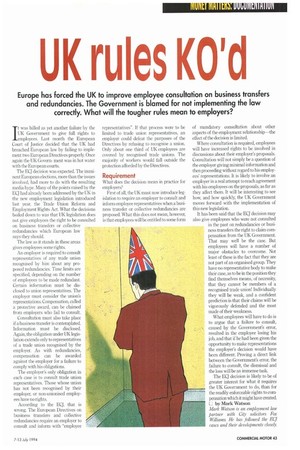UK rules KO'd
Page 45

If you've noticed an error in this article please click here to report it so we can fix it.
Europe has forced the UK to improve employee consultation on business transfers and redundancies. The Government is blamed for not implementing the law correctly. What will the tougher rules mean to employers?
It was billed as yet another failure by the UK Government to give full rights to employees. Last month the European Court of Justice decided that the UK had breached European law by failing to implement two European Directives properly. Once again the UK Government was in hot water with the European courts.
The ECJ decision was expected. The imminent European elections, more than the issues involved, had more to do with the resulting media hype. Many of the points raised by the ECJ had already been addressed by the UK in the new employment legislation introduced last year, the Trade Union Reform and Employment Rights Act. What the decisions boiled down to was that UK legislation does not give employees the right to be consulted on business transfers or collective redundancies which European law says they should.
The law as it stands in these areas gives employees some rights.
An employer is required to consult representatives of any trade union recognised by him about any proposed redundancies. Time limits are specified, depending on the number of employees to be made redundant. Certain information must be disclosed to union representatives. The employer must consider the union's representations. Compensation, called a protective award, can be claimed from employers who fail to consult.
Consultation must also take place if a business transfer is contemplated. Information must be disclosed. Again, the obligation under UK legislation extends only to representatives of a trade union recognised by the employer. As with redundancies, compensation can be awarded against the employer for a failure to comply with his obligations.
The employer's only obligation in each case is to consult trade union representatives. Those whose union has not been recognised by their employer, or non-unionised employees have no rights.
According to the ECJ, that is wrong. The European Directives on business transfers and collective redundancies require an employer to consult and inform with "employee
representatives". If that process were to be limited to trade union representatives, an employer could defeat the purposes of the Directives by refusing to recognise a union. Only about one third of UK employees are covered by recognised trade unions. The majority of workers would fall outside the protection afforded by the Directives.
Requirement
What does the decision mean in practice for employers?
First of all, the UK must now introduce legislation to require an employer to consult and inform employee representatives when a business transfer or collective redundancies are proposed. What this does not mean, however, is that employees will be entitled to some form
of mandatory consultation about other aspects of the employment relationship--the effect of the decision is limited.
Where consultation is required, employees will have increased rights to be involved in discussions about their employer's proposals. Consultation will not simply be a question of the employer giving minimal information and then proceeding without regard to his employees' representations. It is likely to involve an employer in a real attempt to reach agreement with his employees on the proposals, as far as they affect them. It will be interesting to see how, and how quickly, the UK Government moves forward with the implementation of this new legislation.
It has been said that the ECJ decision may also give employees who were not consulted in the past on redundancies or business transfers the right to claim compensation from the UK Government. That may well be the case. But employees will have a number of major obstacles to overcome. Not least of these is the fact that they are not part of an organised group. They have no representative body to make their case, as to be in the position they find themselves means, of necessity, that they cannot be members of a recognised trade union! Individually they will be weak, and a confident prediction is that their claims will be vigorously defended and the most made of their weakness.
What employees will have to do is to argue that a failure to consult, caused by the Government's error, resulted in the employee losing his job, and that if he had been given the opportunity to make representations the employer's decision would have been different. Proving a direct link between the Government's error, the failure to consult, the dismissal and the loss will be an immense task.
The ECJ decision is likely to be of greater interest for what it requires the UK Government to do, than for the readily enforceable rights to compensation which it might have created. L by Mark Watson
Mark Watson is an employment law partner with City solicitors Fox Williams. He has followed the ECJ cases and their developments closely.
































































































